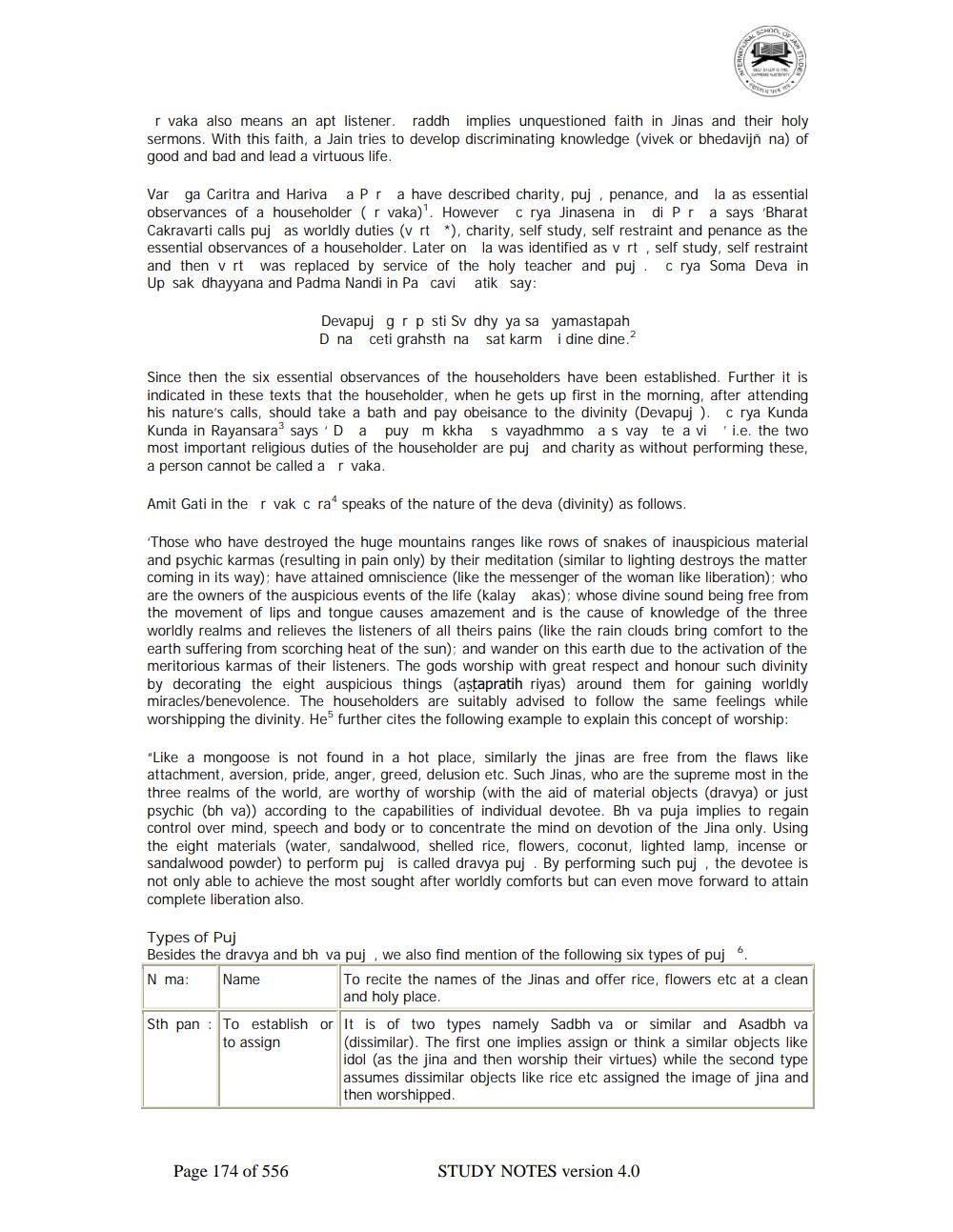________________
r vaka also means an apt listener. raddh implies unquestioned faith in Jinas and their holy sermons. With this faith, a Jain tries to develop discriminating knowledge (vivek or bhedavijň na) of good and bad and lead a virtuous life.
Var ga Caritra and Hariva apr a have described charity, puj. penance, and la as essential observances of a householder (r vaka)'. However crya Jinasena in di Pra says 'Bharat Cakravarti calls puj as worldly duties (v rt *), charity, self study, self restraint and penance as the essential observances of a householder. Later on la was identified as v rt, self study, self restraint and then v rt was replaced by service of the holy teacher and puj. c rya Soma Deva in Up sak dhayyana and Padma Nandi in Pa caviatik say:
Devapuj grp sti Sv dhy ya sa yamastapah D na ceti grahsth na sat karm i dine dine.?
Since then the six essential observances of the householders have been established. Further it is indicated in these texts that the householder, when he gets up first in the morning, after attending his nature's calls, should take a bath and pay obeisance to the divinity (Devapuj ). c rya Kunda Kunda in Rayansara' says 'D a puy m kkha svayadhmmo as vay te a vi'i.e. the two most important religious duties of the householder are puj and charity as without performing these, a person cannot be called a r vaka.
Amit Gati in the
vak c rao speaks of the nature of the deva (divinity) as follows.
'Those who have destroyed the huge mountains ranges like rows of snakes of inauspicious material and psychic karmas (resulting in pain only) by their meditation (similar to lighting destroys the matter coming in its way); have attained omniscience (like the messenger of the woman like liberation); who are the owners of the auspicious events of the life (kalay akas); whose divine sound being free from the movement of lips and tongue causes amazement and is the cause of knowledge of the three worldly realms and relieves the listeners of all theirs pains (like the rain clouds bring comfort to the earth suffering from scorching heat of the sun); and wander on this earth due to the activation of the meritorious karmas of their listeners. The gods worship with great respect and honour such divinity by decorating the eight auspicious things (astapratih riyas) around them for gaining worldly miracles/benevolence. The householders are suitably advised to follow the same feelings while worshipping the divinity. He further cites the following example to explain this concept of worship:
"Like a mongoose is not found in a hot place, similarly the jinas are free from the flaws like attachment, aversion, pride, anger, greed, elusion etc. Such Jinas, who are the supreme most in the three realms of the world, are worthy of worship (with the aid of material objects (dravya) or just psychic (bh va)) according to the capabilities of individual devotee. Bh va puja implies to regain control over mind, speech and body or to concentrate the mind on devotion of the Jina only. Using the eight materials (water, sandalwood, shelled rice, flowers, coconut, lighted lamp, incense or sandalwood powder) to perform puj is called dravya puj . By performing such puj, the devotee is not only able to achieve the most sought after worldly comforts but can even move forward to attain complete liberation also.
Types of Puj Besides the dravya and bh va puj, we also find mention of the following six types of puj N ma: Name
To recite the names of the Jinas and offer rice, flowers etc at a clean
and holy place. Sth pan : To establish or it is of two types namely Sadbh va or similar and Asadbh va to assign
(dissimilar). The first one implies assign or think a similar objects like idol (as the jina and then worship their virtues) while the second type assumes dissimilar objects like rice etc assigned the image of jina and then worshipped.
Page 174 of 556
STUDY NOTES version 4.0




